- Home
- Iain Pears
The Bernini Bust ja-3 Page 8
The Bernini Bust ja-3 Read online
Page 8
But at least there was one car that he instantly fell in love with. It was a pre-oil-crisis Cadillac. 1971. Light blue. Open topped. About the size of the Queen Mary, and used as much fuel.
Well why not? Argyll thought when he saw it. He'd never drive anything like it again. This was a moving piece of cultural history. The first thing he did when he got back was to get the doorman of the hotel to take a photograph of him resting against it, wearing sunglasses. So he could show his grandchildren, who might not otherwise believe such machines had ever existed.
So after Morelli left, Argyll went round to the parking lot behind the hotel. The car started, eventually, and in a billowing cloud of lead-laced petrol fumes he navigated slowly out. It had the acceleration and the manoeuvrability of a supertanker, but otherwise was in reasonable condition, apart from the rust patches. The main thing was that it went forward when requested, and stopped when asked. And traffic regulations in California are such that an ability to accelerate from nought to sixty in under five minutes is a bit redundant, anyway.
The machine roared along, backfiring periodically, and having to stop every 150 yards for traffic lights. Argyll tried admiring the scenery, and found himself wondering how any place could support so many car dealers.
It took him about half an hour to drive the six miles to Venice, Jack Moresby's part of town, although he reckoned he could have done it faster had he known where he was going. Once he'd found the place, it took considerable imagination to see why it was called Venice at all; though a rather stagnant patch of water and a sort of piazza-thing that might have been impressive had it been finished, gave a clue as to the original intentions of the developers.
Still, it looked like being a much more appealing part of the world than the rather obsessive bit of town which housed the museum. The residents' main occupation seemed to be sitting around not doing very much; and Argyll was only too glad to see it. Despite their reputation for being relaxed, everybody else in the city seemed to be constantly hurrying. On the rare occasions that they stopped working, they still bustled manically. Even on the beach they insisted on running around, throwing things at each other and jumping in and out of the ocean for no obvious reason. It was agreeable to see that some people liked just to lie about, immune to their fellow-citizens' frantic desire to prolong their lives forever. The place was scruffy, fly-blown and charming, or so it seemed. Perhaps that was how it got its name.
It was also almost as difficult to get your bearings as in its Italian namesake. Finding the abode of Jack Moresby was harder than he'd anticipated, and he was very surprised when he did eventually track it down. Not what he'd anticipated at all. He knew that Moresby had retreated from the consumer society to write the Great American Novel - a common failing in this part of town, he'd been told - but he'd anticipated that the son of a multi-billionaire would have hung on to some of the vestiges of the good life. He'd met many alternative types in Italy, and they all seemed to find handmade Versace clothes, Rolex watches and nine-room apartments overlooking the Piazza Navona perfectly compatible with the principled rejection of the consumerist tyranny.
Young Moresby, however, seemed determined to do it properly. His home was not the stereotypical millionaire's residence and bore little resemblance to a Beverly Hills mansion. Millionaires' houses have roofs, with windows in the side. And when windows break, millionaires have them replaced; they don't patch the holes with old newspaper. When a tile falls off the roof they replace it, rather than leaving the rare downpour of rain to come in. Millionaires have gardens, complete with gardeners, Jack Moresby's equivalent bore more than a passing resemblance to the depot where Argyll had hired his car. Nor, in general, do millionaires sprawl on the floor of the little deck at the back, smoking a cigarette with a most unusual aroma, drinking from a half-empty bottle.
Moresby regarded him passively as he approached, then ha. waved a hand in casual and unenthusiastic greeting.
'Hey,' he said, a term Argyll had learnt was the local, all-purpose way of indicating hello, goodbye, surprise, alarm, warning, interest, lack of interest, and do you want something to drink. The American looked at a seat by his side, pushed an old and mangy dog off and gestured for him to sit. Argyll eyed the clumps of dog hair warily, then reluctantly eased himself down.
'Come to commiserate about the old man, I suppose,' he said absently, squinting up at the weak sun through the clouds.
'When did you hear?'
'Langton phoned me last night. And everything else I picked up from the police when they woke me up at dawn to ask me to account for my movements. I suppose it would be far too much to expect my stepmother to come a whole twenty miles to pass on the news. Too busy celebrating, I guess. What d'you want?'
A good question. Pertinent and to the point. The trouble was Argyll didn't really know. After all, he could hardly say he wanted to dig something up about the bust so he could get back into more amicable contact with Flavia. Wouldn't sound right. Heartless, in fact. Besides, initial questioning made it clear that Moresby knew nothing about the Bernini - or any bust, for that matter. Nor did it seem appropriate to enquire why Jack Moresby couldn't be bothered to drive the few miles back to the museum himself to find out what was going on. All families have their ways of going about things.
'I thought you might want company,' he said rather lamely. 'You struck me as being the only tolerably sane and normal person involved with the museum.'
It provided no reason at all, but it seemed to do. Moresby gave him an odd look, but it seemed more prompted by surprise that anybody could act humanely than suspicion at his motives. He proffered the bottle by way of welcome. Bourbon was the last thing Argyll wanted at that time of day, but he felt it was uncivil to refuse. He took a long suck and, while he was getting his voice back, and trying to stop his eyes watering, Moresby rambled on about his old man.
They were not close, Argyll divined. It appeared that old Moresby had cut the aspiring author out of his will a year or so ago – depriving someone of a couple of billion dollars does sometimes make relations a little frosty.
'Why did he do that?'
'Let's just say he had a really weird sense of humour. He wanted me to follow him and make more money. I reckoned he'd made enough already. So he said that if money was so unimportant to me, he'd leave all of his to someone who appreciated it more.'
'Like his wife?'
'She adores the stuff.'
'And the museum?'
'A virtual money sink.'
'And this was meant to make you mend your ways?'
'I guess. But, here I am, penniless. Likely to stay that way, as well. Too late to change his mind now.'
'But he didn't really cut you out, did he?'
'Not specifically, no. Just didn't leave me anything. Same thing. "To my dear son I leave my very best wishes." Or some such. No one can accuse him of inconsistency.'
'I suppose that's lucky, in a way,' Argyll commented.
'Why's that?'
'Well, the police are looking for whoever killed him. You had a perfect motive for keeping him alive.'
'Yup. And an alibi, too, as Langton phoned me after the body was found and I was here.'
Argyll did some quick calculations. That fitted. No way he could have got back that fast. What a suspicious person you are, he thought.
'And where were you?' Moresby asked.
'Me?'
'Yes. You. After all, if you're going to check up on me, it's only fair I should check up on you.'
'Fair enough. I was in a restaurant until an hour after the murder. Lots of witnesses. No trouble there.'
'Hmm. OK, I'll believe you. That's us out. That leaves that Spaniard, doesn't it?'
Argyll wrinkled his nose to indicate disapproval of police thought patterns. 'So the police seem to think, but I don't rate him as a murderer. He wanted to sell your father too much sculpture. Killing the goose is one thing, but a sensible person would wait until it laid an egg or two. Besides, Hector's always
appallingly polite to clients. Shooting them is not in his book of etiquette. On the other hand, I must admit that until he turns up he's likely to be the front runner.'
'You reckon?'
'Yes. But I'm sure he'll reappear. He hardly seemed homicidal when I talked to him just before the murder. Did he?'
Moresby confessed he didn't really know how homicidal tendencies manifested themselves in party conversation.
'I rather suspected your stepmother, myself,' Argyll confessed, not sure whether this was a good thing to say. Jack didn't seem to mind. 'But Morelli tells me she'd already left and has an alibi from her chauffeur. Are you sure she was having an affair?'
'Oh, sure. Lots of absences, extended shopping expeditions, weekends away with girlfriends. Easy enough to work out.'
'And your father knew?'
'He did after I'd rung his office to tell him, yes.' Jack looked at him curiously. 'I suppose you reckon that's pretty disgusting, eh? And you're right. But that bitch poisoned his mind to get me cut out, and all I was doing was fighting back. Fair's fair.
'I guess it's sad I didn't see the old man before he died,' he went on meditatively. 'I shouldn't have left so soon. Hadn't seen him for, oh, must have been six months or so. Call me an old sentimentalist, but I would have given a lot just to have called him a mean old bastard one more time. By way of farewell. You know.'
Argyll nodded understandingly. 'Well, I'm glad you're taking it OK. Just came to see.'
'Appreciate it. Come up for a proper drink sometime.'
Argyll considered it. 'Thanks. Maybe I will. But I think I'll go back to Rome in a few days. If I stay here much longer I'll probably get run over.'
'Safest drivers in the world, we Californians.'
'Tell that to the driver of the purple truck that nearly took my kneecaps off.'
Moresby looked sympathetic.
'Of course, it might have been my fault,' Argyll said, determined to be fair. 'Partly, at least.'
'Don't say that,' Moresby advised. 'Never admit fault. Then you can sue the driver if you find him.'
'I don't want to sue him.'
'But if he finds you, he might sue you.'
'What on earth for?'
'Emotional distress caused by the closeness of damage to his fender. Sort of things courts take seriously out here.'
Only just convinced that Moresby was joking, Argyll took his leave, first asking for directions back to his hotel. His sense of direction was such that he could well have landed in the Rockies without guidance at every turn. Right, right and left at the bar, Moresby said. Then follow your nose. Yes, it does serve food. Argyll didn't want any, really, but thought it would be a good place to stop, so he could get more directions and soak up the whisky. Just in case.
He did. Ate a vegetarian hamburger of mind-boggling awfulness, drank a cup of coffee so weak you could see through it, and proceeded to round off a perfect day in a hospital bed with a broken leg.
It was perfectly simple. He drove all the way back to the hotel without making a single wrong turn, had a shower and then headed up the freeway to pay his respects to Mrs. Moresby. No mishaps or problems whatsoever. Except that, technically speaking, he didn't need to take a freeway at all, but got wedged in an entry lane and had no choice. Even, miracle of miracles got the right exit. Well, more or less. Down the ramp to the lights and right turn at the end, put on the brakes to slow down in the officially approved manner, and nothing happened.
Or rather, everything did. His vast and unwieldy Cadillac sailed majestically through the red lights, narrowly missing an assortment of cars, buses and trucks coming across at him. Mounted the sidewalk, still travelling at a decorous twenty-five miles an hour and scarcely jolted by the bump due to the formidable suspension, then proceeded inexorably through a twenty-foot-square plate glass window of, as Morelli mentioned, a designer clothes store, causing considerable damage to their stock.
Fortunately it was a very expensive shop, catering only to the seriously wealthy and, at the time of his entry, had no customers whatever. Indeed, there had been no customers at all so far that day. Business was so bad that the one saleswoman felt it perfectly safe to go out the back for a few moments for a quick smoke. Regulations forbade her to smoke inside the building and neither the owner nor the few customers approved.
It was just as well that she did, as when she returned the shop was not in the tidy condition in which she had left it. Argyll's left leg was jammed hard down on the brake pedal, even though the mechanism refused absolutely to respond. And, in a habit picked up from too much time in Rome, he indicated his pique at developments to curious spectators by throwing both hands above his head in the archetypal Italian gesture that indicates a cosmic despair at the bizarre absurdity and unfairness of life.
And he was in this posture when the front end of the car, fortunately several yards ahead of him, hit a brick wall in the centre of the building. Argyll was pushed forward, but his left leg, wedged against the brake pedal, tried to keep his body in place and gave way under the strain. A sizeable portion of the rest of him crashed against the steering wheel, unrestrained as it was by his hands which had still not completed their gesture, and broken glass coming in the other direction completed the damage.
Damn it, he thought as he lost consciousness. I'll never be able to criticise Flavia's driving again.
Chapter Six
Flavia arrived at the office at ten in the morning, feeling very much the worse for wear. She had, after all, been up until the early hours chasing phantom art dealers, and had spent what little remained of the night in bed, strangely disturbed about Argyll's likely condition. An expensive phone call to the hospital yielded only platitudes and a point-blank refusal to let her talk to him. He was as fine as could be expected and asleep; and anyway, who was she?
A friend, she said. If there was any change in his condition would they call immediately. They said they were not authorised to make overseas calls. So call Detective Morelli, then. This they agreed to do.
It was mere habit that brought her into the office, combined with the simple realisation that there was not much else to do. She was summoned immediately to Bottando's office when she arrived.
'Good God, you look awful,' he said as she staggered in. 'Anyone would think you'd been up all night.'
She tried, but failed, to stifle a yawn and did her best to focus on him properly. 'I suppose you want to hear about di Souza,' she said. 'He wasn't on the plane.'
'I know,' he replied. 'I've been having another long chat with that Morelli. He's launched a request - official this time - for our help.'
'If his murderer's not here, I don't see what we can do. What sort of help?'
'This bust. May have come from here, probably smuggled, certainly stolen from a packing case next to the body. Perhaps a connection. They want to know what it is. So do I. As you've looked into this already, I thought you'd better continue with it. If you're up to it.'
She was halfway to protesting that she'd wasted enough time on this already, but Bottando's implied reference to female frailty swung her decision the other way. Of course she was up to it. Just a little woozy, that was all.
Bottando, of course, who'd known her for several years now, had seen certain that the comment was just the deft little touch that was required. For himself, he was largely of the opinion that the matter could wait, certainly until the Americans actually recovered the thing, and they could find out whether it was worth trying to get back.
But international co-operation was always prestigious, and he was quite pleased that his department was getting involved rather than tie carabinieri. It looked good on the annual report, that sort of thing, and his fiefdom was small enough and vulnerable enough not d be able to turn its nose up at high-profile activities, no matter how utile they were likely to prove.
On top of that, of course, Morelli had mentioned that Argyll had suggested the contact, so he owed him one. Putting Flavia on to it, Le reckoned, paid the de
bt promptly and generously. Judging by what Morelli had said - the Englishman with a broken leg and liable to be sued for enough money to restock an entire shop full of French lingerie, quite apart from hospital bills - he needed all the help he could get at the moment.
'So,' she said, yawning again and overcoming a reluctance to get involved in anything concerning Argyll, sorry for him though she felt, 'what do you want me to do?'
'First,' he said, listing the points on the fingers of a pudgy little hand, 'Go out, and buy yourself several of the strongest coffees you an lay your hands on. Second, drink them. Third, get the paper -Herald Tribune would be the best - and see what it says about this whole business. Then see what you can find out about this bust, finally, go and see the man who bought it. Man called Langton, apparently. He lives in Rome, and is flying back today.'
'He bought Argyll's Titian,' she said absentmindedly.
'Hmm. Find out where he got the Bernini from, how much he aid for it, how it left the country, what di Souza's gripe was. You'd better dig out di Souza's file as well. There must be one somewhere round here. I really must get our filing system sorted out. Go and see his friends, search his apartment. Usual stuff.'
'And then?'
'Then,' he said, smiling slightly as he noticed that she was beginning to revive a little. Got her, he thought. Stage one complete,
'Then you can stop for lunch.'
Of course, it took longer than that; drinking coffee and reading newspapers can't be hurried. A couple of hours later, Flavia had learnt what there was to know about the case from the fulsome reports in the papers, drunk the better part of a litre of coffee and then decided to go straight into lunch to consider matters.
She was feeling very much better. For all her reluctance, the case had tickled her fancy a little, and Argyll's mishap had done something to soften her hostile thoughts. He was still an idiot, of course, but he was manifestly a bigger danger to himself than he was to anyone else.

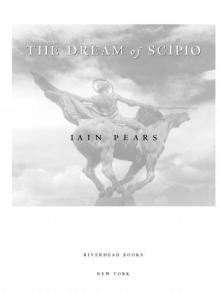 The Dream of Scipio
The Dream of Scipio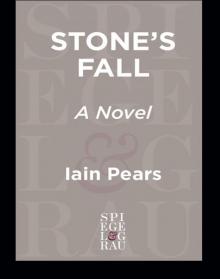 Stone's Fall
Stone's Fall The Last Judgement
The Last Judgement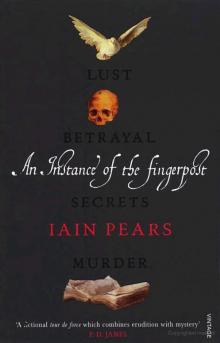 An Instance of the Fingerpost
An Instance of the Fingerpost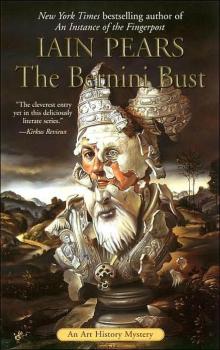 The Bernini Bust
The Bernini Bust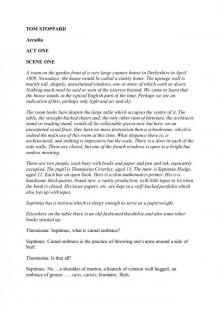 Arcadia
Arcadia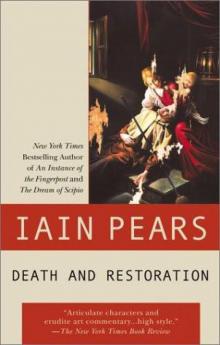 Death and Restoration
Death and Restoration The Raphael Affair
The Raphael Affair The Titian Committee
The Titian Committee The Immaculate Deception
The Immaculate Deception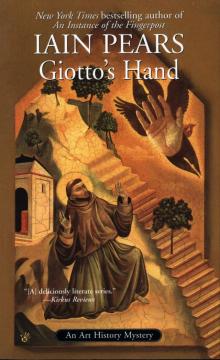 Giotto's hand
Giotto's hand The Portrait
The Portrait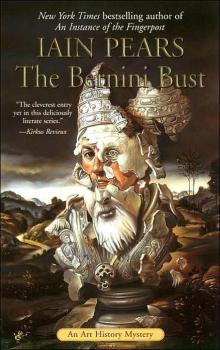 The Bernini Bust ja-3
The Bernini Bust ja-3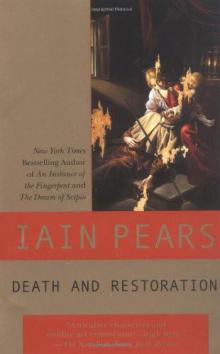 Death & Restoration ja-6
Death & Restoration ja-6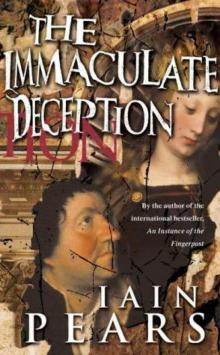 The Immaculate Deception ja-7
The Immaculate Deception ja-7